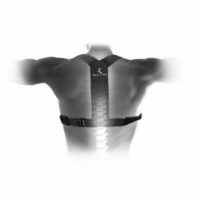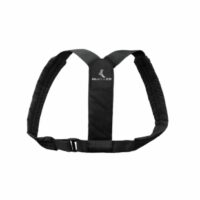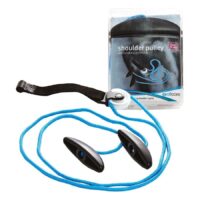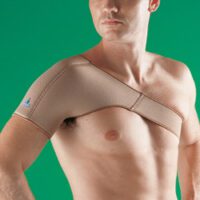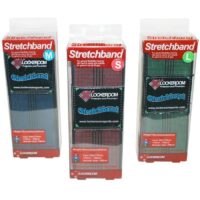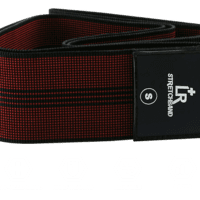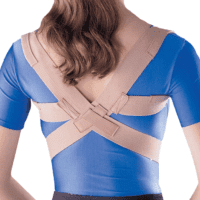Shoulder Impingement
Article by J.Miller, S.Armfield

Shoulder Impingement
Shoulder impingement is a condition where the shoulder’s tendons or bursa get trapped and compressed. This compression can cause pain and sometimes even lead to other conditions like shoulder bursitis or rotator cuff tendinopathy. Often, this problem arises due to abnormal shoulder movements, which might be because of weak or in-coordinated muscles.
Where Does the Shoulder Impinge?
The main area where impingement occurs is the shoulder impingement zone. This is the narrow space between the head of the humerus (your upper arm bone) and the top of the shoulder blade. A simple click in the shoulder might be the first sign of this condition. If left untreated, this can escalate to more severe problems like reduced movement and loss of shoulder function. When talking about specific tendons, terms like supraspinatus or infraspinatus impingement come into play. The supraspinatus tendon is most commonly affected.
If you’re experiencing persistent pain, reduced movement, or weakness in your shoulder, it’s important to seek medical advice. Treatments can range from physiotherapy to surgery in serious cases.
Symptoms of Shoulder Impingement

There are various symptoms linked to this condition:
- Pain or a clicking sound when putting your hand behind your back or head.
- Pain when reaching for something like a seatbelt.
- An arc of pain when lifting your arm.
- Discomfort when lying on the affected shoulder.
- Persistent pain, even when resting.
- Muscle pain or weakness during lifting or reaching.
It’s essential to get these symptoms checked out. If left untreated, they can worsen over time.
Tests for Shoulder Impingement
A qualified shoulder physiotherapist or doctor can perform tests to diagnose this condition. The aim is to pinpoint the exact problem and rule out other potential causes of shoulder pain. Tests can include checking the shoulder’s range of motion, assessing rotator cuff strength, and more. This comprehensive evaluation will aid in determining the best treatment plan.
Diagnostic Tests
An ultrasound scan can be a cost-effective way to diagnose this condition. It offers a dynamic view of the impingement and can detect other related injuries. On the other hand, an MRI might detect tears but won’t show dynamic impingement. X-rays aren’t very useful for detecting impingement either but can show if there are any bone abnormalities.
Always consult with a healthcare professional to decide the best tests for your situation.
Who is at Risk?
Individuals often engaged in overhead arm movements, like tennis players or swimmers, are more at risk. See Swimmers Shoulder.
Also, jobs requiring repetitive overhead lifting can increase the chances of developing this condition.
What Causes Rotator Cuff Impingement?
Rotator cuff impingement is a common shoulder problem with two main types of causes: primary (structural) and secondary (related to posture and movement).
Primary Rotator Cuff Impingement – Structural Narrowing
A key structural cause is the natural shape of your shoulder. Some people are born with a smaller space under the acromion (the top of the shoulder blade). This smaller space is known as the sub-acromial space. Additionally, conditions like osteoarthritis can lead to the development of bony spurs in this area, further reducing the available space.
When this space is narrowed, it increases the likelihood of compressing (or impinging) the soft tissues within, such as the bursa and rotator cuff tendons. This compression can lead to inflammation and irritation, resulting in conditions like bursitis or rotator cuff tendonitis.
Secondary Rotator Cuff Impingement – Dynamic Instability
The second type of impingement is related to how your shoulder moves – what we call dynamic instability. This means your shoulder joint moves excessively or has ligament laxity and muscular weakness around it.
This form of impingement often develops over time due to repetitive overhead activities, trauma, previous injuries, poor posture, or lack of use. When your shoulder is unstable, the rotator cuff is under more strain and has to work harder, which can lead to injury.
An overworked rotator cuff can become fatigued, inflamed, and weakened. This weakening can be due to pain inhibition or even tendon tears. As the rotator cuff becomes less effective, it can’t prevent the head of the humerus (upper arm bone) from moving upwards into the sub-acromial space. This upward movement can squash the bursa or rotator cuff tendons, leading to impingement.
The Importance of Proper Treatment
Without appropriate treatment, shoulder instability can lead to recurring injuries. Moreover, poor training techniques or overtraining can exacerbate the problem, leading to overuse injuries like bursitis or tendinopathy.
Treatment for Shoulder Impingement
The first step in treating this condition is identifying the root cause. Treatment can vary depending on the affected structure. It’s crucial to consult with a healthcare professional experienced in treating shoulder issues.
There are several stages to successfully rehabilitate shoulder impingement. These stages range from protecting the injured area to engaging in high-speed or high-load exercises before returning to sport or work. However, each case is unique, so a customised exercise program is vital.
If you suspect you have shoulder impingement, arrange a consultation with a shoulder physiotherapist or doctor for specific advice.
Conclusion
In conclusion, shoulder impingement is a prevalent condition that affects many, especially those involved in activities requiring repetitive overhead movements. It arises from the compression of the rotator cuff tendons and bursa in the shoulder, leading to pain and restricted movement. With early detection and the right treatment, it’s possible to alleviate the symptoms and prevent further complications.
Whether it’s through physiotherapy, medication, or in some cases, surgery, the key is to address the root cause and adopt a holistic approach to rehabilitation. If you’re experiencing symptoms of this syndrome, don’t hesitate to seek medical advice. Remember, early intervention can mean a quicker road to recovery and a return to pain-free movement.
Rochedale - Call 38410277
Book Online: RochedaleSalisbury - Call 32751044
Book Online: SalisburySandgate - Call 32691122
Book Online: SandgateRelated Articles
- Shoulder Bursitis Treatment, Physio & Helpful Tips: This article discusses the treatment and management of shoulder bursitis, a common source of shoulder pain due to inflammation of the shoulder’s bursa.
- Rotator Cuff Tendinopathy – Physio Advice: Explores various aspects of rotator cuff tendinopathy, including its relation to shoulder blade pain and the effectiveness of cortisone injections for a torn rotator cuff.
- What Is Your Scapulohumeral Rhythm?: Discusses the importance of neck-scrapulo-thoracic-shoulder function in treating shoulder pain and injury, providing a more holistic view of shoulder health.
- Rotator Cuff Tear: A detailed look into rotator cuff tears, a condition that can be a consequence of or a contributing factor to shoulder impingement.
- Swimmer’s Shoulder: This article is particularly relevant as it discusses an overuse injury common in swimmers, leading to shoulder pain and impingement symptoms.
- Bicep Tendinopathy: Offers information on bicep tendinopathy, a condition affecting the bicep tendon leading to pain in the front of the shoulder, which can be related to or exacerbated by shoulder impingement issues.
- Frozen Shoulder (Adhesive Capsulitis): Here, readers will find information on shoulder conditions related to muscle strain and stiffness, and surgeries like rotator cuff repair, which are relevant to shoulder impingement.
- AC Joint Injury: This article discusses injuries to the acromioclavicular joint, common in athletes and after falls, offering insights into shoulder joint issues.
- Shoulder Arthritis: It provides information on degenerative joint disease affecting the shoulder, causing pain and stiffness, which can be a concern for those with shoulder impingement.
- Functional Shoulder Instability: This article discusses chronic shoulder instability, which can lead to recurrent subluxations and dislocations, a concern in shoulder impingement cases.











































